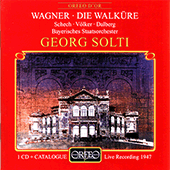Franz Völker
Although Völker initially worked in a bank, his fine natural voice came to the attention of Clemens Krauss, then in charge of the Frankfurt Opera, who encouraged him to consider becoming a singer. After a brief period of study, he made his debut at the Frankfurt Opera in 1926 as Florestan / Fidelio, remaining a member of the Frankfurt ensemble until 1935 and maintaining close links with it thereafter. He joined the Vienna State Opera in 1931, remaining until 1935 and returning for the 1939–1940 and 1949–1950 seasons.
At the Salzburg Festival Völker made his debut in 1931 as Ferrando / Così fan tutte. He was to be a frequent Salzburg guest, his roles including Florestan (1931–1934), the Emperor / Die Frau ohne Schatten (1932–1933), Menelaus / Die aegyptische Helena (1934) and Max / Der Freischütz (1939). Even greater was his presence at the Bayreuth Festival where between 1933 and 1942 he was considered incomparable in the title role of Lohengrin. At Bayreuth he also sang Erik / Der fliegende Holländer and the title part in Parsifal.
Throughout the period up to the outbreak of World War II Völker was active internationally: he appeared in Brussels and Budapest in 1934 and in the same year made his debut at the Royal Opera House, London singing Florestan and Siegmund / Die Walküre, repeating this role in 1937. He made his debut in Amsterdam in 1935 and at the Paris Opera in 1936, as Florestan. He appeared at the Florence Maggio Musicale in 1938 and also sang in concert at Rome, having previously made his debut at La Scala, Milan.
Having sung as a guest at the Berlin State Opera from 1933, Völker joined this company in 1935, remaining a member until 1945. He also enjoyed great success with the opera companies of Hamburg and Munich. From 1945 to 1952 he was a member of the Munich company, where his roles included the title part in Otello. His repertoire also included Walther / Die Meistersinger von Nürnberg, Belmonte / Die Entführung aus dem Serail, Canio / Pagliacci and the title role in Don Carlo.
In addition to his operatic work Völker was a most accomplished singer of operetta and lieder, as his numerous recordings clearly demonstrate. He retired from singing in 1952 and taught in his home town of Neu-Isenburg, later being appointed a professor at the Stuttgart Music High School in 1958.
Völker’s voice was remarkably smooth throughout the complete tenor range. He brought elegance and musicality to whatever he chose to sing.
© Naxos Rights International Ltd. — David Patmore (A–Z of Singers, Naxos 8.558097-100).

















